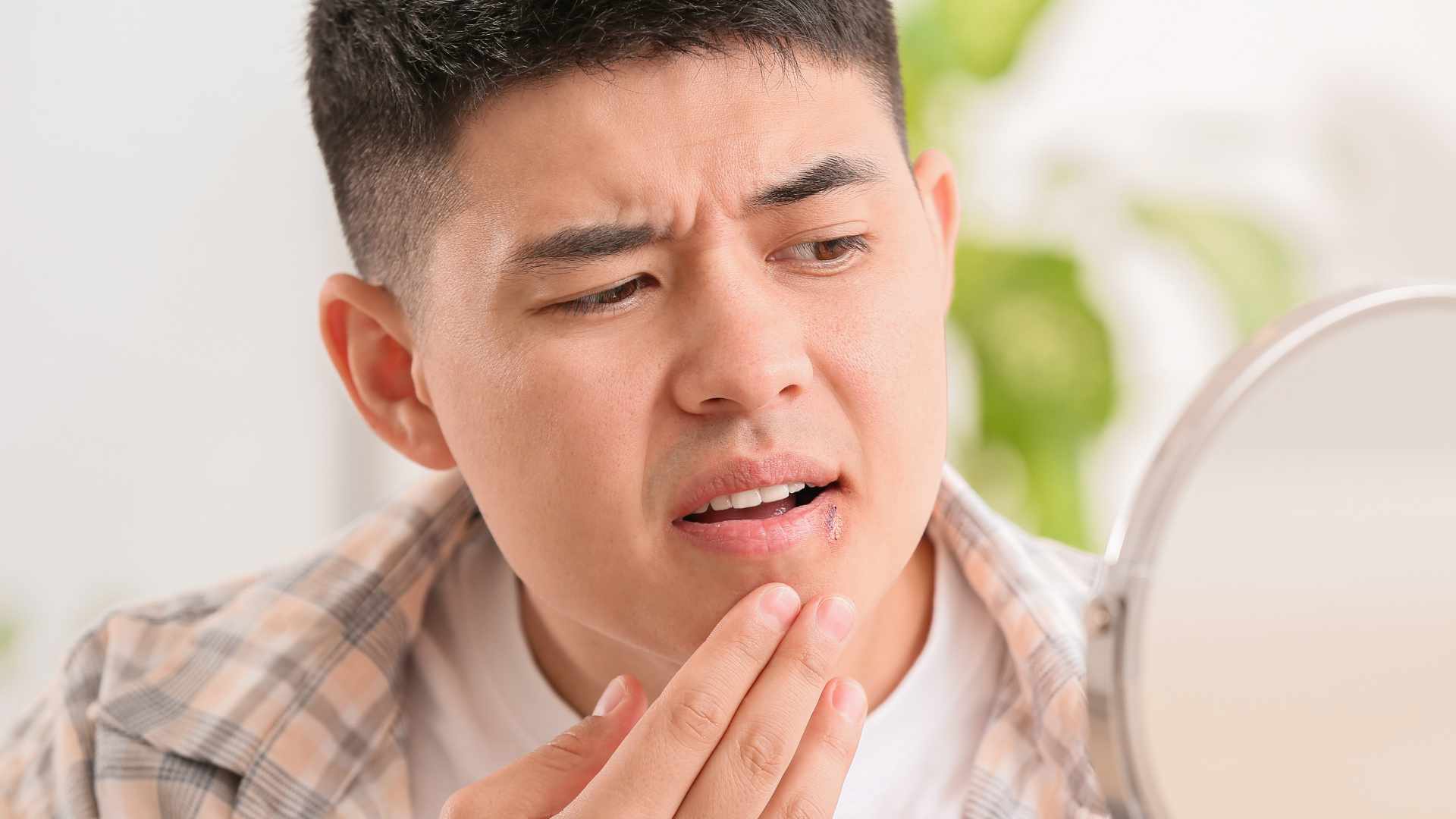Imagine waking up with a pesky cold sore on your lip and needing to get rid of it quickly. Look no further, as this article provides you with simple yet effective tips on how to banish that cold sore within just 24 hours. Whether you’ve got an important event or simply want to regain your confidence, these practical strategies will help you tackle that cold sore head-on and restore your skin to its natural clarity in no time. Say goodbye to discomfort and hello to a speedy recovery!
Cold Sore Overview

Cold sores, also known as fever blisters, are small blisters that commonly appear on or around the lips and are caused by the herpes simplex virus (HSV). While they are usually harmless, cold sores can be unsightly and uncomfortable. Understanding the causes and symptoms of cold sores can help you manage and prevent future outbreaks.
What is a cold sore?
A cold sore is a small blister or group of blisters that typically appear on or around the lips. They are caused by the herpes simplex virus (HSV), which can be classified into two types: HSV-1 and HSV-2. Cold sores are most commonly caused by HSV-1 and can be easily spread through direct contact with the blister or by sharing personal items such as utensils or lip balms.
Causes of cold sores
Cold sores are primarily caused by the herpes simplex virus (HSV-1), although HSV-2 can also be responsible in some cases. The virus is highly contagious and can be easily transmitted through close contact with an infected individual or by sharing items such as lip balms, towels, or eating utensils. Other factors that can trigger a cold sore outbreak include:
- Weakened immune system
- Stress
- Hormonal changes
- Excessive sun exposure
- Fatigue
- Injuries to the lip area
Symptoms of cold sores
Cold sores typically go through different stages before they heal completely. The initial symptoms may include a tingling or burning sensation around the lips, followed by the appearance of small, fluid-filled blisters. These blisters can be painful and may burst, resulting in the formation of a crust or scab. Other symptoms associated with cold sores include:
- Swollen lymph nodes
- Sore throat
- Fever
- Headache
- Muscle aches
How To Get Rid Of A Cold Sore In 24 Hours?
If you’ve noticed the onset of a cold sore or are in the early stages of an outbreak, taking immediate action can help speed up the healing process and alleviate discomfort.
1. Apply antiviral ointment
One of the first steps you can take when you notice a cold sore is to apply an over-the-counter antiviral ointment. These ointments, containing ingredients like docosanol or acyclovir, can help to reduce the severity and duration of the outbreak. Apply the ointment as directed on the packaging, usually several times a day.
2. Take over-the-counter pain relievers
To alleviate any pain or discomfort associated with a cold sore, you can take over-the-counter pain relievers such as ibuprofen or acetaminophen. These medications can help to reduce inflammation and provide temporary relief from pain and fever.
3. Avoid touching or picking at the cold sore
While it may be tempting, it is important to resist the urge to touch or pick at the cold sore. This can worsen the outbreak and increase the risk of spreading the virus to other areas of your body or to other people. Touching or picking at the cold sore can also lead to bacterial infection and delay the healing process.
4. Use a cold compress
To soothe the pain and reduce swelling, you can apply a cold compress to the affected area. Simply wrap a few ice cubes in a clean cloth and hold it against the cold sore for a few minutes. Repeat this process several times a day, making sure to wash the cloth afterward to prevent the spread of the virus.
Home Remedies

In addition to immediate actions, there are several home remedies that may help in treating a cold sore and promoting faster healing.
1. Apply aloe vera gel
Aloe vera has soothing and antiviral properties that can help with the healing of cold sores. Apply pure aloe vera gel to the affected area several times a day. Alternatively, you can use an over-the-counter aloe vera gel specifically formulated for cold sore treatment.
2. Use tea tree oil
Tea tree oil possesses antiviral properties and can help to speed up the healing process of cold sores. Dilute a few drops of tea tree oil with a carrier oil, such as coconut or olive oil, and apply it to the cold sore using a cotton swab. Repeat this process several times a day.
3. Apply a cold tea bag
Using a cold tea bag, such as black tea or green tea, can help to relieve pain and promote healing. Steep the tea bag in hot water for a few minutes, then remove it and allow it to cool. Once cooled, apply the tea bag directly to the cold sore for several minutes. Repeat this process multiple times a day.
4. Dab on lemon balm extract
Lemon balm extract is known for its antiviral and soothing properties. Apply a small amount of lemon balm extract directly to the cold sore using a cotton swab. Repeat this process several times a day for optimal results.
5. Try witch hazel
Witch hazel has astringent properties that can help to dry out the cold sore and promote faster healing. Apply witch hazel to the affected area using a cotton swab, making sure to dilute it if necessary. Repeat this process several times a day.
6. Apply ice
Applying ice to the cold sore can help to reduce pain and swelling. Wrap a few ice cubes in a clean cloth and apply it to the cold sore for a few minutes. Repeat this process several times a day, taking breaks in between to prevent damage to the skin.
Hygiene Practices
Practicing good hygiene is essential when dealing with a cold sore to prevent the spread of the virus and reduce the risk of further outbreaks.
1. Wash hands frequently
Regularly washing your hands with soap and water is crucial to prevent the spread of the herpes simplex virus. Wash your hands thoroughly after touching or applying any medication to the cold sore, and avoid touching your face or rubbing your eyes throughout the day.
2. Avoid sharing personal items
To minimize the risk of spreading the virus, it is important to avoid sharing personal items such as lip balms, towels, utensils, or drinking glasses. These items can harbor the virus and increase the likelihood of transmission.
3. Disinfect items that come into contact with the cold sore
To prevent the spread of the virus and reduce the risk of reinfection, it is important to regularly disinfect items that come into contact with the cold sore. This includes towels, eating utensils, toothbrushes, and any other items that have come into direct contact with the cold sore. Use an antiviral disinfectant or wash these items with hot water and soap.
Dietary Considerations

Incorporating certain foods into your diet and avoiding others can help in managing and preventing cold sore outbreaks.
1. Increase intake of lysine-rich foods
Lysine is an amino acid that can help to suppress the herpes simplex virus and prevent cold sore outbreaks. Include foods rich in lysine, such as fish, poultry, dairy products, legumes, and vegetables like broccoli and spinach, in your diet.
2. Avoid arginine-rich foods
Arginine is an amino acid that can trigger cold sore outbreaks. To minimize the risk of outbreaks, reduce your intake of arginine-rich foods such as nuts, seeds, chocolate, and whole grains.
3. Eat foods high in vitamins and minerals
Maintaining a well-balanced diet that is rich in vitamins and minerals can help to strengthen your immune system and reduce the frequency of cold sores. Include foods high in vitamin C, vitamin E, zinc, and beta-carotene, such as citrus fruits, almonds, leafy greens, and carrots, in your diet.
Over-the-Counter Medications
Several over-the-counter medications can be helpful in managing cold sore symptoms and promoting faster healing.
1. Topical creams or patches
Topical creams or patches containing ingredients such as benzocaine or lidocaine can help to numb the area and provide temporary relief from pain and itching. These treatments can also help to speed up the healing process.
2. Antiviral lip balms
Antiviral lip balms that contain ingredients like docosanol or acyclovir can help to reduce the severity and duration of a cold sore outbreak. Apply the lip balm directly to the affected area as directed on the packaging.
3. Pain relieving gels or creams
Over-the-counter pain relieving gels or creams, such as those containing benzocaine or lidocaine, can help to alleviate pain and discomfort associated with cold sores. Apply the gel or cream to the cold sore as directed on the packaging.
Prescription Medications

In severe cases or for individuals experiencing frequent and recurrent outbreaks, prescription medications may be recommended by a healthcare professional.
1. Antiviral medications
Antiviral medications, such as acyclovir, famciclovir, or valacyclovir, can help to reduce the severity and duration of a cold sore outbreak. These medications are typically taken orally and may require a prescription from a healthcare professional.
2. Oral medications for severe outbreaks
For severe outbreaks that are causing significant pain or discomfort, oral medications such as ibuprofen or acetaminophen may be recommended to help manage symptoms. These medications can also help to reduce inflammation and fever.
Prevention Strategies
Taking proactive steps to prevent cold sore outbreaks can help to minimize their occurrence.
1. Manage stress
Stress can weaken the immune system and increase the likelihood of cold sore outbreaks. Engage in stress-reducing activities such as exercise, meditation, or hobbies to manage stress levels and decrease the chance of an outbreak.
2. Avoid excessive sun exposure
Excessive sun exposure can trigger cold sore outbreaks. Protect your lips from the sun’s harmful rays by wearing a lip balm with SPF, using a wide-brimmed hat, and seeking shade during peak sun hours.
3. Maintain a strong immune system
A strong immune system is essential for preventing and managing cold sore outbreaks. Maintain a healthy lifestyle by eating a balanced diet, getting regular exercise, and getting enough sleep. Additionally, consider taking immune-boosting supplements if recommended by a healthcare professional.
4. Use sunscreen on lips
To protect your lips from sun damage and reduce the risk of cold sore outbreaks, apply sunscreen specifically designed for lips with a high SPF. Reapply the sunscreen regularly, especially when spending time outdoors.
Professional Medical Help
If you experience frequent or severe cold sore outbreaks, or if complications arise, it is advisable to seek medical attention from a doctor or dermatologist.
1. Consult a doctor or dermatologist
A healthcare professional can provide guidance and recommend appropriate treatments for managing cold sores. They may also prescribe antiviral medications or other treatments if necessary.
2. Consider professional treatments
In some cases, professional treatments such as laser therapy, topical antiviral treatments, or medical procedures may be recommended by a dermatologist to manage severe or recurrent outbreaks. These treatments can help to reduce the frequency and severity of cold sores.
When to Seek Medical Attention?

In most cases, cold sores will heal on their own within two weeks. However, there are certain situations where it is advisable to seek medical attention.
1. Frequent or severe outbreaks
If you experience frequent or severe cold sore outbreaks that significantly impact your daily life, it is recommended to consult a healthcare professional. They may be able to provide additional treatments or suggest lifestyle changes to manage and prevent future outbreaks.
2. Complications arise
While rare, complications can sometimes arise from cold sore outbreaks. If you notice signs of infection, such as increased pain, swelling, or oozing pus from the cold sore, it is important to seek medical attention.
3. Cold sore does not heal within 2 weeks
In most cases, cold sores will heal within two weeks. If a cold sore persists for longer than this duration, it is recommended to consult a healthcare professional for further evaluation and possible treatment options.
By following these tips, you can effectively manage and prevent cold sores, promoting faster healing and minimizing discomfort. Remember to consult a healthcare professional for personalized advice and treatment options, especially if you experience frequent or severe outbreaks or if complications arise. With proper care and attention, you can keep cold sores at bay and maintain a healthy, confident smile.
Conclusion
Getting rid of a cold sore in just 24 hours may seem like an impossible task, but with these tips and tricks, it can become a reality. Remember to start treating the cold sore as soon as you feel that tingling sensation, drink plenty of fluids, get enough rest, and avoid touching or picking at the sore. With proper care and treatment, your cold sore should be gone in no time. Don’t let a pesky cold sore ruin your day – take action and say goodbye to it within 24 hours!




